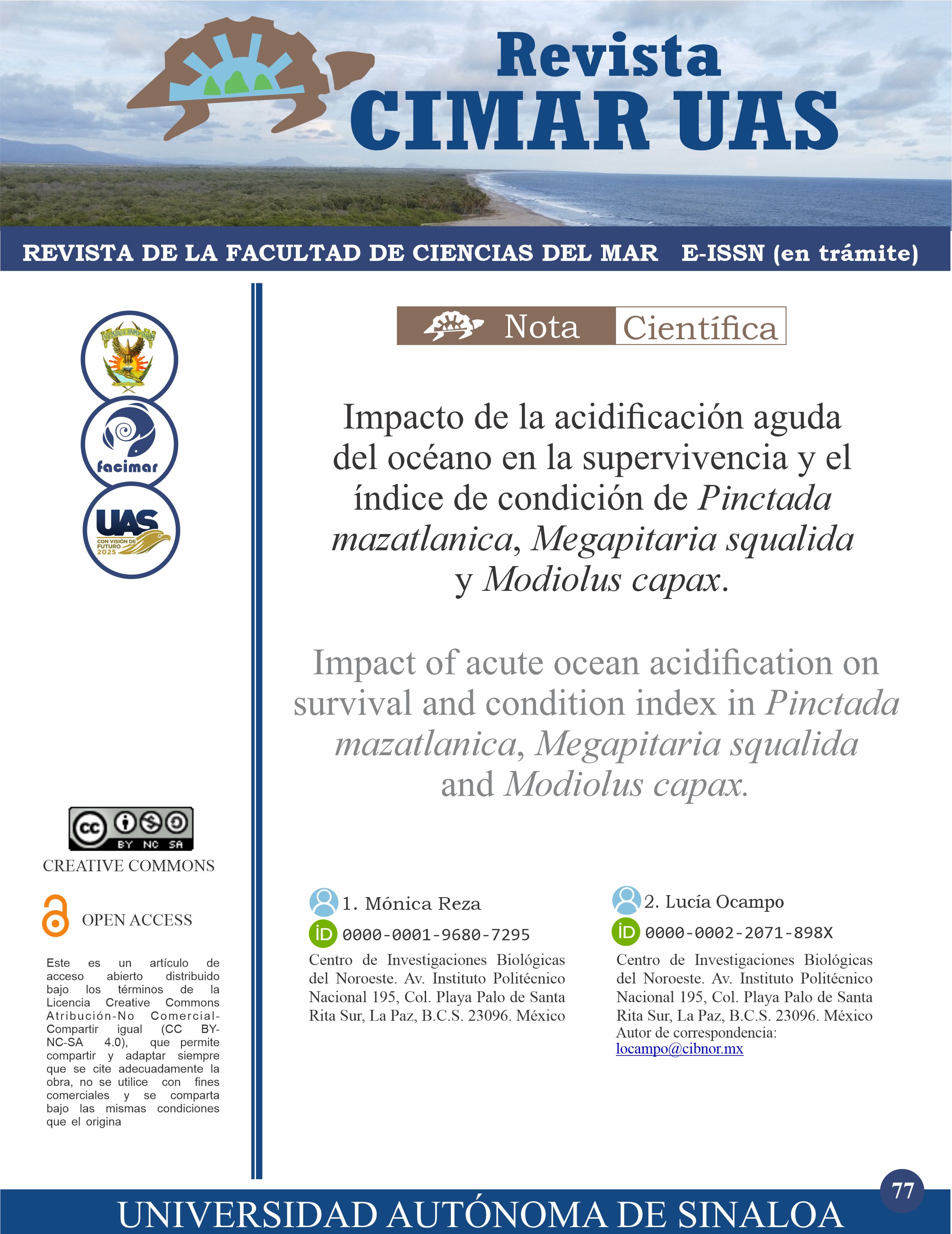Impact of acute ocean acidification on survival and condition index in Pinctada mazatlanica, Megapitaria squalida and Modiolus capax.
Keywords:
ocean acidification, bivalves, LC50, survival, condition indexAbstract
Climate change and ocean acidification have emerged as global concerns, with mollusks identified as particularly susceptible to their impacts. The initial method to assess animal responses to acute stress involves evaluating their survival and Condition Index (CI). In this study, we investigated these responses in three high-value shellfish species —Pacific pearl oyster Pinctada mazatlanica (Pteriidae), Chocolate clam Megapitaria squalida (Veneridae), and Fat horse mussel Modiolus capax (Mytilidae)— across three seawater pH levels (8.1, 7.5, and 6.9). Survival rates in the pearl oyster remained unaffected by acute exposure to acidified seawater, whereas survival in the chocolate clam decreased to 91.7% at the lowest pH level, and in the mussel, it further declined to 75%. Although significant differences in CI were observed between species, no differences were noted across pH treatments. This suggests that, at least in the short term, these bivalve species appear capable of tolerating ocean acidification.
Downloads
References
Bamber, R.N. (1987). The effects of acidic sea water on young carpet-shell clams Venerupis decussata (L.) (Mollusca: Veneracea). Journal of Experimental Marine Biology and Ecology. 108(3), 241-260. doi: 10.1016/0022-0981(87)90088-8
Bamber, R.N. (1990). The effects of acidic seawater on three species of lamellibranch mollusc. Journal of Experimental Marine Biology and Ecology. 143(3), 181-191. doi: 10.1016/0022-0981(90)90069-O
Busch, D.S. and McElhany, P. (2017). Using mineralogy and higher-level taxonomy as indicators of species sensitivity to pH: a case-study of Puget Sound. Elementa. 5, 53. doi: 10.1525/elementa.245
Cooley, S.R., Rheuban, J.E., Hart, D.R., Luu, V., Glover, D.M., Hare, J.A. and Doney, S.C. (2015). An integrated assessment model for helping the United States sea scallop (Placopecten magellanicus) fishery plan ahead for ocean acidification and warming. PLOS ONE. 10(5), e0124145. doi:10.1371/journal.pone.0124145
Doney, S.C., Fabry, V.J., Feely, R.A. and Kleypas, J.A. (2009). Ocean acidification: The other CO2 problem. The Annual Review of Marine Science. 1, 169-192. doi: 10.1146/annurev.marine.010908.163834
Doney, S.C., Busch, D.S., Cooley, S.R. and Kroeker, K.J. (2020). The impacts of ocean acidification on marine ecosystems and reliant human communities. Annual Review of Environment and Resources. 45, 83–112. doi: 10.1146/annurev-environ-012320-083019
Duquesne, S., Liess, M. and Bird, D.J. (2004). Sub-lethal effects of metal exposure: physiological and behavioural responses of the estuarine bivalve Macoma balthica. Marine Environmental Research. 58, 245–250. doi:10.1016/j.marenvres.2004.03.066
Gosling, E. (2004). Bivalve Molluscs. Biology, Ecology and Culture. Bodmin, Cornwall, England: MPG Books Ltd. doi:10.1002/9780470995532
Gray, A.P., Lucas, I.A.N., Seed, R. and Richardson, C.A. (1999). Mytilus edulis chilensis infested with Coccomyxa parasitica (Chlorococcales, Coccomyxacea). Journal of Molluscan Studies. 65(3), 289–294. doi: 10.1093/mollus/65.3.289
IPCC. (2013). Summary for Policymakers. In T.F. Stocker, D. Qin , G.-K. Plattner, M. Tignor, S.K. Allen, J. Boschung, A. Nauels, Y. Xia, V. Bex & P.M. Midgley (Eds.), Climate Change 2013: The Physical Science Basis. Contribution of Working Group I to the Fifth Assessment Report of the Intergovernmental Panel on Climate Change. United Kingdom and New York, NY, USA: Cambridge University Press, Cambridge.
Jahnsen-Guzmán, N., Lagos, N.A., Quijón, P.A., Manríquez, P.H., Lardies, M.A., Fernández, C., Reyes, M., Zapata, J., García-Huidobro, M.R., Labra, F.A. and
Duarte, C. (2022). Ocean acidification alters anti-predator responses in a competitive dominant intertidal mussel. Chemosphere. 288, 132410. doi: 10.1016/j.chemosphere.2021.132410
Kroeker, K.J., Kordas, R.L., Crim, R., Hendriks, I.E., Ramajo, L., Singh, G.S., Duarte, C.M. and Gattuso, J.P. (2013). Impacts of ocean acidification on marine organisms: quantifying sensitivities and interaction with warming. Global Change Biology. 19, 1884–1896. doi: 10.1111/gcb.12179
López-Carvallo, J.A., Saucedo, P.E., Rodríguez-Jaramillo, C., Campa-Córdova, A.I., García-Corona, J.L. and Mazón-Suástegui, J.M. (2017). Carbohydrate-Rich diets meet energy demands of gametogenesis in hatchery conditioned mussels (Modiolus capax) at increasing temperatures. Journal of Shellfish Research. 36(3), 649-657. doi: 10.2983/035.036.0314
López-Rocha, J.A., Ceballos-Vázquez, B.P., García-Domínguez, F.A., Arellano-Martínez, M., Villalejo-Fuerte, M. and Romo-Piñera, A.K. (2010). The Squalid Callista Megapitaria squalida (Bivalvia:Veneridae) fishery in Baja California Sur, Mexico. Hidrobiológica. 20(3), 230-237.
Melzner, F., Stange, P., Trübenbach, K., Thomsen, J., Casties, I., Panknin, U., Gorb, S.N. and Gutowska, M.A. (2011). Food Supply and Seawater pCO2 Impact Calcification and Internal Shell Dissolution in the Blue Mussel Mytilus edulis. PLOS ONE. 6(9), e24223. doi: 10.1371/journal.pone.0024223

Downloads
Published
Data Availability Statement
As of Jun 26, the references and links of the article were available for verification.

 Cada manuscrito está bajo la licencia Atribución-NoComercial-SinDerivadas 4.0 Internacional (CC BY-NC-ND 4.0)
Cada manuscrito está bajo la licencia Atribución-NoComercial-SinDerivadas 4.0 Internacional (CC BY-NC-ND 4.0) 